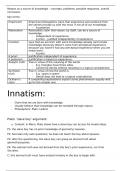Summary
Summary - epistemology - reason as a source of knowledge (7172)
- Institution
- AQA
a summary sheet of all year 1 epistemology reason as a source of knowledge. covering topics of innatism, empiricism and rationalism. in this sheet it contains the strengths and weaknesses of each theory, possible responses and overall judgement. it provides a framework to aid in answering both long...
[Show more]



